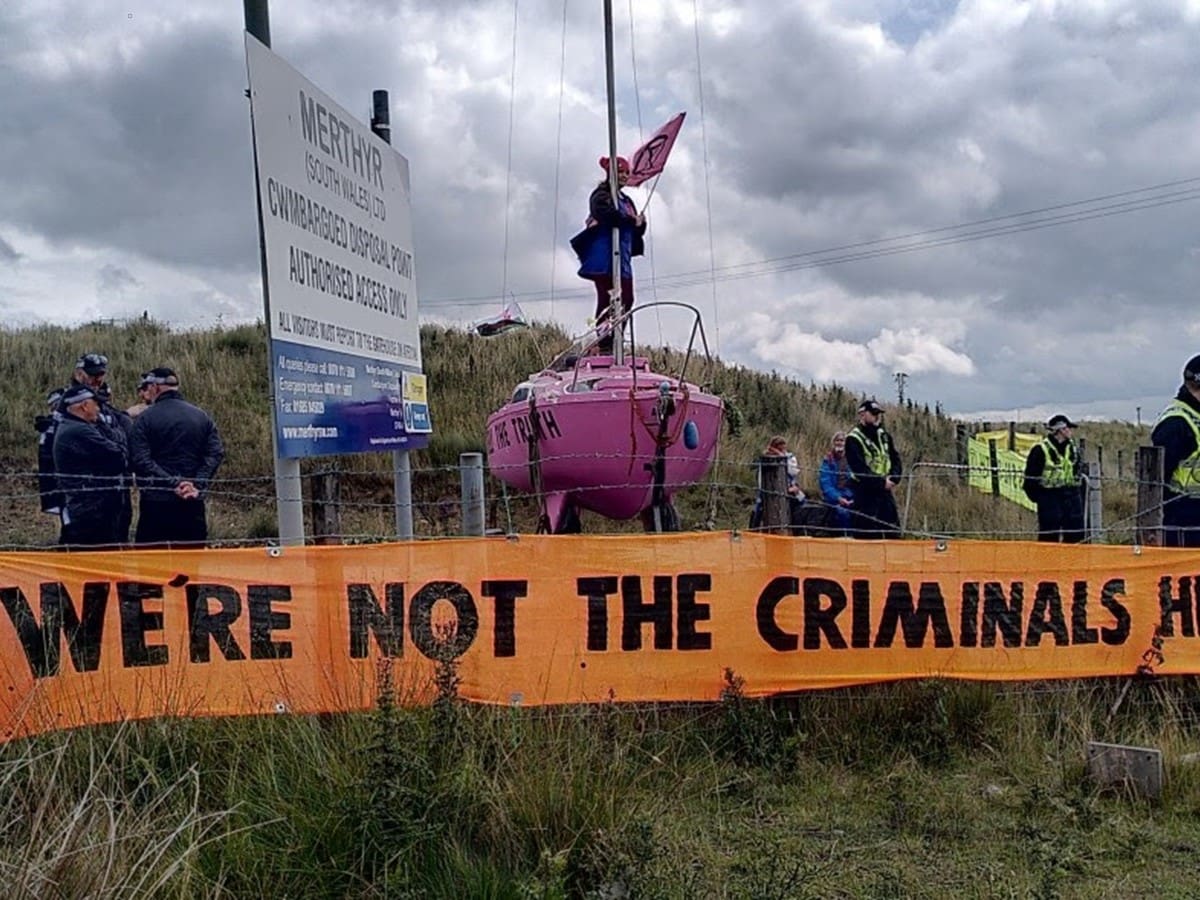The Crown Prosecution Service (CPS) has dropped all charges against four Extinction Rebellion activists who blockaded the entrance to the UK’s largest open-cast coal mine, Wales‘s Ffos-y-Fran, in 2023 with a pink boat.
While removing the immediate burden of legal confrontation for the defendants, the decision has left a “crater of unfinished business” in the fight for climate justice, against fossil fuels, and accountability for local residents.
Ffos-y-Fran: 10 months of unlicensed activity
Merthyr (South Wales) Limited started operating Ffos-y-Fran, located about 25 miles north of Cardiff, in 2007. It is the UK’s largest opencast coal mine. However, after 15 years of opposition from local residents and ecological campaigners, Merthyr was supposed to stop mining on 6 September 2022. When the day arrived, though, the company simply applied for an extension and continued taking coal from the ground, causing despair for residents and campaigners.
Then, on 26 April, Merthyr Tydfil County Borough Council unanimously rejected the extension. This should have stopped Merthyr completely. However, the company simply continued operating the mine, leading the council to issue an enforcement notice that took effect on 27 June and gave Merthyr another 28 days to comply. By then, though, Coal Action Network said Merthyr was likely operating Ffos-y-Fran “unlawfully”.
As a result, members of Extinction Rebellion decided to stop it themselves – and cops arrested them.
A much deeper impact
One of the four defendants who occupied the site for over 24 hours in July 2023 was Liz Pendleton. She explained:
The action was always designed to have a much deeper impact beyond the immediate disruption with a pink boat. It was designed to expose the alleged illegal activities and environmental negligence of the mining operation, in particular, its continued operation beyond permitted planning conditions and contradictory and misleading financial statements which may well constitute fraud.
The Ffos-Y-Fran mine in Merthyr Tydfil, Wales had been operating without a licence for almost ten months when Extinction Rebellion activists took direct action. Liz noted:
By denying us our day in court the CPS has denied us the opportunity to shine a light on this potentially illegal and criminal operation.
The legal proceedings revealed a shocking lack of cooperation from the mine, including failure to provide basic operational logs, communications between the mine and governmental bodies, and internal documents relating to the financial and environmental management of the mine’s operations.
This critical information would have shed light on the legal position of the operation and whether funds had been set aside for environmental restoration – which was a condition for the getting the go ahead in the face of overwhelming local opposition. The defendants were also confident this would have led to their acquittal.
A shadow cast over Ffos-y-Fran proceedings
The dropping of the case also casts doubt on the legitimacy of the arrests, as in the case of aggravated trespass the police can clearly be seen acting in the interests of corporate bodies who then fail to prove that they themselves were carrying out lawful activities.
The discontinuation of charges is a testament to the strength of the activists case and the shaky foundation upon which the mine’s operations stood, explained Raj Chada from Hodge Jones & Allen, representing the defendants:
In seeking disclosure from the CPS, we highlighted the need for transparency on several critical points. Our requests were aimed at uncovering potential evidence of the mine operating beyond legal scrutiny, which raises concerns about the legality of its operations.
The CPS’s inability to meet these disclosure obligations casts a shadow over the proceedings and suggests that the depth of the mine’s legal and environmental mismanagement may be greater than previously understood.
A complex milestone
For over a decade and a half, the Ffos-Y-Fran mine has been a symbol of the environmental and social challenges that face communities at the ‘coal face’ of climate degradation.
The abrupt end to this case marks not a clear-cut victory but a complex milestone in the ongoing struggle.
While it spares the defendants the strain of a continuing court battle – already exceeding seven months in duration – it denies the platform to publicly expose the depth of negligence and alleged fraud by the mine’s operators, Merthyr (South Wales) Ltd., including their failure to fulfil obligations towards land reparations and the creation of green jobs.
Speaking upon hearing the news, local resident and defendant Marcus Bailie commented:
Our fight was not just against the physical act of coal extraction but against disregard for the land’s future and the community’s well-being. The piles of coal and the colossal scar on the landscape left behind serve as stark reminders of the environmental impact that has yet to be addressed.
The real victory would have been to hold those responsible to account in a public forum, forcing a reckoning with the consequences of their actions.
Marcus went on to say:
We’re not the criminals here.
Ffos-y-Fran: people feel angry and betrayed
Chris and Alyson Austin, residents of Merthyr Tydfil who have been campaigning for years for the mine to be closed said:
We feel angry and betrayed about the waste-land they have left behind.
The bittersweet outcome underscores the resilience and dedication of activists and the broader environmental movement.
It also highlights the complexities of seeking justice in a system where procedural technicalities can overshadow substantive issues.
The fight for the Ffos-Y-Fran mine was never just about legal vindication; it was about bringing to light the injustices inflicted upon nature and communities – and campaigners promise, it won’t end here.
Featured image via Extinction Rebellion




